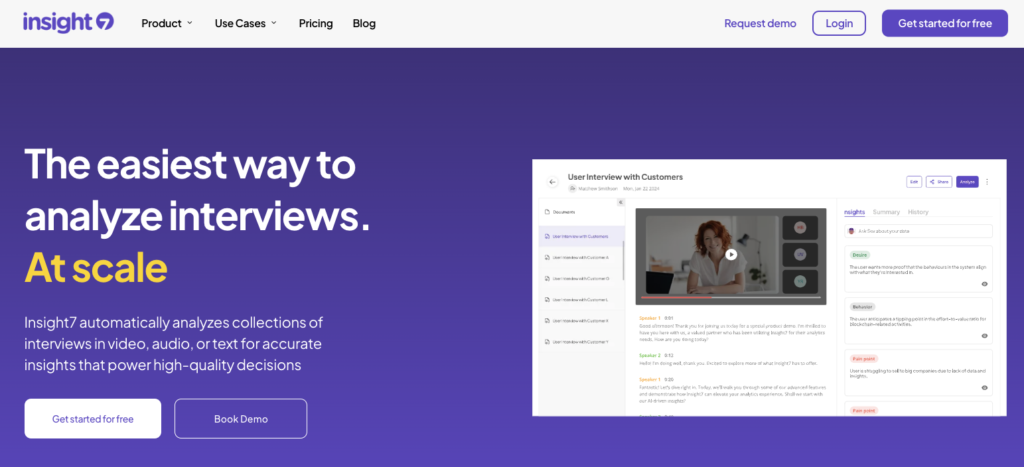
Employee interviews are pivotal in various fields like private investigation, insurance claims, and compensation assessments. The process of analyzing these interviews can be sophisticated, but leveraging technological advancements can streamline it significantly. Let’s explore how these analyses work and their importance in different sectors.
The Role of Technology in Interview Analysis
Modern tools and platforms have revolutionized the way employee interviews are analyzed. By utilizing templates and AI services, investigators can gather insights and generate comprehensive reports efficiently. Here are some key features and steps involved:
- Question Templates: These templates allow investigators to customize and focus their questions based on the specific needs of the investigation. As mentioned in the document, users can edit templates to suit their requirements and pull insights swiftly.
- Summarizing Insights: After conducting multiple interviews, summarizing the collected data is crucial. Investigators either use their experience to manually synthesize information or leverage technology to export data insights as CSV or PDF files. This capability significantly reduces the time spent on manual data collation.
- Data Visualization: Visualizing recurring themes and sentiment across interviews helps in understanding the overall narrative. Tools that offer visual summaries of positive or negative sentiments and recurring themes across multiple interviews provide a clearer and quicker analysis process.
- Data Privacy and Security: The document emphasizes that data privacy is a critical aspect, ensuring that uploaded documents and interview transcripts remain confidential within the user’s account.
Practical Applications in Private Investigation
Private investigators often analyze employee interviews to uncover relevant facts and gather evidence. The streamlined use of technological tools can enhance their efficiency in several ways:
- Case Summaries: Investigators create case summaries outlining issues, interviewees, summaries of statements, and findings. Tools that help in organizing and summarizing interview data can accelerate this process.
- Insight Extraction: By using platforms that allow bulk uploading and transcription, investigators can pull out specific insights or ideas from large datasets. This aids in focusing on critical points and maintaining the integrity of evidence collected.
- Customizable Reports: Investigators can generate detailed reports that include abstract summaries and comprehensive narratives. This ensures that all essential points are covered while providing a clear and concise overview.
Importance in Insurance Claims
Employee interviews are integral in assessing insurance claims for health, workers’ compensation, and other related fields. The analysis of these interviews can help in validating claims and ensuring fair compensation. Here is how it works:
- Fraud Detection: Analyzing interviews can reveal inconsistencies or corroborate the evidence provided by claimants. Advanced platforms can highlight discrepancies, thereby aiding fraud detection.
- Efficiency in Claims Processing: Technological tools that provide quick data extraction and summarization help insurance companies process claims faster. This reduces the turnaround time and improves customer satisfaction.
- Comprehensive Analysis: Visual tools and sentiment analysis enable insurers to gain a holistic view of the claimant’s statements, facilitating better decision-making.
Significance in Compensation Assessments
In the context of workers’ compensation and other employee-related compensations, interview analysis plays a crucial role in assessing eligibility and the extent of compensation required:
- Detailed Reports: Similar to the methods used in private investigations, compensation assessors can create detailed reports summarizing the employee’s condition, statements, and findings. This ensures transparency and fairness in compensation decisions.
- Pattern Recognition: By analyzing multiple interviews, assessors can recognize patterns that might indicate underlying issues or recurring claims. This helps in addressing systemic problems within organizations.
- Legal Compliance: Accurate and detailed analysis ensures that compensation assessments comply with legal standards and regulations, thereby avoiding potential legal complications.
Conclusion
The analysis of employee interviews for private investigation, insurance, and compensation purposes is a critical process that benefits significantly from technological advancements. The ability to customize questions, extract insights efficiently, and visualize data ensures that investigators, insurers, and compensation assessors can perform their roles more effectively. By focusing on privacy and accuracy, these tools not only streamline the analysis process but also contribute to fairer and more transparent outcomes.
In conclusion, leveraging modern tools and platforms in analyzing employee interviews can transform the investigative landscape, making it more efficient, reliable, and equitable. As technology continues to evolve, so will the capabilities and effectiveness of these analytical processes, ultimately benefiting all stakeholders involved.




